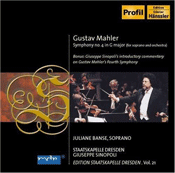While that recording dates from the early 1990s, Sinopoli performed the work later in his career with different forces, and that resulted in an impressive reading of the Fourth Symphony with the Staatskapelle Dresden. The performance of the Fourth Symphony was part of the 1999 Dresden Music Festival, specifically a concert given on 29 May 1999. With this recent issue by Hänssler in its Profil series in the Edition Staatskapelle Dresden, a fine recording of that performance is now available.
This later recording is notable in several way, since it is an impressive performance of the work and involves a fine interpretation of the Song-Finale “Das himmlische Leben” by the soprano Juliane Banse. In addition, the recording also preserves a seventeen-minute talk by Sinopoli, which serves as an introduction to the work. (The talk is given in German, with a transcription by Eberhard Steindorf included in the program notes.)
As a respected interpreter of Mahler’s music, Sinopoli brings a fine sense of style to his conception of this work. The first movement is conceived well, with a deft sensitivity to the form of the movement and its scoring. From the opening moments of the movement, Sinopoli conveys a dynamism, which allows the work to move forward. His tempo for the opening gesture, the so-called *Schellenkappe *- the jangling bells of the fool’s cap - are perfunctory, so that Sinopoli can give a more nuanced shape to the main theme. This kind of fluidity is characteristic of the entire movement is carefully structured, without seeming calculated. Such attention to details is consistent throughout, and includes a well-conceived tempo for the coda, which has the appropriate sense of underscoring the music that came before it.
With the Scherzo, Sinopli offers a similarly structured approach to the work, so that the passages for the *scordatura *solo violin emerged easily. A similar expansiveness occurs later, when other solo instruments are part of the structure, and the latitude Sinopoli gave those entrances fits well into the overall . His sense of drama at eh climax of the movement stands out from other performances, because of the breadth Sinopoli adds to the music at this point. The cadence into the section suggests, momentarily a sense of rubato, which the strings take up in an exemplary rendering of the portamento Mahler indicated in the score.
The third movement contains an emotional pitch which needs the expression Sinopoli used in this performance. From the opening measures, which evoke the ensemble “Mir ist so wunderbar” in the quartet from the first act of Beethoven’s opera Fidelio, Sinopoli offers a clear vision of this tightly structured movement. A set of double variations, the performance also has a sense of spontaneity which comes from the intense playing of the Staatskapelle Dresden. The sustained pitches of the violins never flag, while the wind sonorities intersect without becoming overbearing. Without seeing the performance, it is possible to perceive an intensity in the interactions of the members of the orchestra in this recording. In some of the passages of the slow movement, the players seems attuned to the score, such that the give-and-take which necessarily occurs in professional ensembles like this one is even more acute. Midway through the movement, in the passage for solo oboe, the slightly slower tempo that Sinopoli used, allows details to emerge, like the written-out ornaments and the horn figures which response to each other distinctively. While it is nowhere rushed, the movement contains a well-considered intensity that solidly sets up the coda, the famous fanfare, which anticipates the concluding movement found in the song “Das himmlische Leben.” As elsewhere in this performance, no details have escaped Sinopoli, and his attention to the final measures of the coda demonstrate his knowledge of Mahler’s works in the way he brought out the motivic relationship to the song “Ich bin der Welt abhanden gekommen”in the thematic content, while simultaneously rendered the texture so that it has a timbral affinity to the scoring, which anticipates the *Adagietto *of the Fifth Symphony.
In the concluding movement, Juliane Banse offers a sensitive reading of the Song-Finale, with exemplary diction and expression. Her phrasing makes sense of both the poetry and its musical setting, a combination which is lauded, but rarely executed. That stated, Banse offers here a moving and insightful reading of the song. The balance between the lower and upper registers of her voice is nicely even, and complemented by a fine tone in the sustained pitches, which Banse takes to the full values of the notation. It is difficult to point to any single passage without slighting others, but the phrase “Sanct Ursula dazu lacht” evinces the dynamic tension and insightful musicality of Banse’s performance, with the portamento reinforcing the cadence and the change of mood in the song. This is but one passage in a performance which is consistently satisfying on various levels. Moreover, in conceiving the Song-Finale, Sinopoli has taken the movement a little more slowly than some other conductors, and this brings out certain elements, which connect the song to the movements which precede it. It is, ultimately, a convincing performance because of the intensity, which emerges in the various details that come together brilliantly.
This performance is a fine addition to the discography of the composer, and especially that of the Fourth Symphony. While a number of fine recordings of this work exist, the execution of the score in this particular performance offer perspectives which demonstrate the perennial appeal of this work. Without displacing the other fine recording of the Fourth Symphony which Sinopoli released, those who appreciate his intelligent and exciting art will not be disappointed in this extraordinary performance from the latter part of his career. Moreover, Sinopoli’s introduction to the work, the last band of the CD, affords the opportunity of hearing the late conductor talk about this music in person, and this is a welcome bonus on this outstanding recording.
James L. Zychowicz
